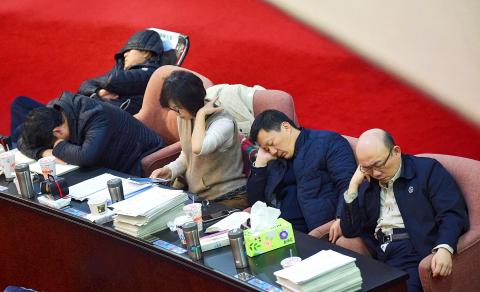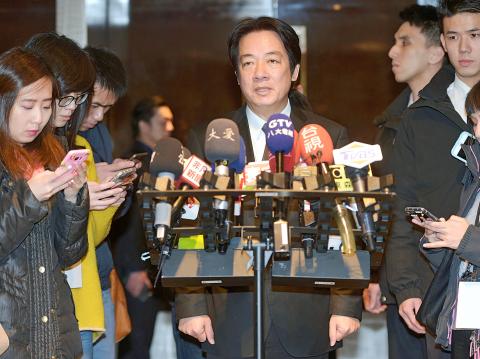Controversial amendments to the Labor Standards Act (勞動基準法) yesterday cleared the legislature, with President Tsai Ing-wen (蔡英文) apologizing for the inconvenience caused by her administration’s two revisions of the act within a year.
Under the amended act, overtime pay is to remain at least 1.33 times a worker’s normal hourly wage for the first two hours and at least 1.66 times from the third hour onward on weekdays.
The rates are to remain at 2.33 and 2.66 times a worker’s normal rates if they are asked to work on their weekly “flexible” day off.

Photo: Liu Hsin-de, Taipei Times
However, workers would no longer be paid overtime in blocks of four hours, but by the actual number of hours they work.
Employers are allowed to raise the monthly overtime cap from 46 to 54 hours after gaining the consent of unions or their employees during employer-staff meetings and notifying the local labor authorities, with the proviso that employees must not be allowed to work more than 138 hours in three months.
Employees would also have the option of converting their overtime into compensatory leave, but if they are unable to use the compensatory in an agreed period of time or before their contract expires, their employer would be required to convert it back into an overtime payment.

Photo: Chang Chia-ming, Taipei Times
The amended act stipulates that employees can roll unused annual leave over to the next year and that employers should convert remaining annual leave days into wages at the end of the second year.
Employers would be allowed to move an employee’s fixed weekly day off within a period of 14 days with the prerequisite that they have gained the approval of unions or employees.
Sectors wishing to adopt the measure would need to pass a review by the local authority and be designated by the Ministry of Labor as a sector that qualifies.
The aforementioned provisos also apply to an amendment that allows employers in approved sectors to shorten the rest time between shifts from 11 to eight hours.
The amendments are to take effect on March 1.
Following the bill being passed at 8:44am, Tsai issued a formal apology to the public for the social unrest caused by the second amendment to the act in a year.
While Premier William Lai (賴清德) has already apologized, Tsai said she felt she owed the public an apology as the head of her administration.
Tsai also thanked police for their hard work due to the protests the amendment provoked.
The controversy surrounding the bill, while causing some turmoil, nonetheless shows that Taiwan is a society willing to accommodate a plurality of opinions, she said.
The act would benefit employers and employees alike, and offer a substantial foundation for industrial transition, she said.
Chinese Nationalist Party (KMT) legislators apologized to workers nationwide over their failure to block the bill.
“We would like to apologize to more than 9 million workers nationwide. Despite our greatest efforts, we were unable to stop the Labor Standards Act from being sabotaged,” KMT caucus secretary-general Lin Wei-chou (林為洲) said.
“We could only do so much, but we truly hope that we can return to power in this year’s local elections and achieve what the central government could not,” KMT Legislator Chen Yi-ming said.

The CIA has a message for Chinese government officials worried about their place in Chinese President Xi Jinping’s (習近平) government: Come work with us. The agency released two Mandarin-language videos on social media on Thursday inviting disgruntled officials to contact the CIA. The recruitment videos posted on YouTube and X racked up more than 5 million views combined in their first day. The outreach comes as CIA Director John Ratcliffe has vowed to boost the agency’s use of intelligence from human sources and its focus on China, which has recently targeted US officials with its own espionage operations. The videos are “aimed at

STEADFAST FRIEND: The bills encourage increased Taiwan-US engagement and address China’s distortion of UN Resolution 2758 to isolate Taiwan internationally The Presidential Office yesterday thanked the US House of Representatives for unanimously passing two Taiwan-related bills highlighting its solid support for Taiwan’s democracy and global participation, and for deepening bilateral relations. One of the bills, the Taiwan Assurance Implementation Act, requires the US Department of State to periodically review its guidelines for engagement with Taiwan, and report to the US Congress on the guidelines and plans to lift self-imposed limitations on US-Taiwan engagement. The other bill is the Taiwan International Solidarity Act, which clarifies that UN Resolution 2758 does not address the issue of the representation of Taiwan or its people in

US Indo-Pacific Commander Admiral Samuel Paparo on Friday expressed concern over the rate at which China is diversifying its military exercises, the Financial Times (FT) reported on Saturday. “The rates of change on the depth and breadth of their exercises is the one non-linear effect that I’ve seen in the last year that wakes me up at night or keeps me up at night,” Paparo was quoted by FT as saying while attending the annual Sedona Forum at the McCain Institute in Arizona. Paparo also expressed concern over the speed with which China was expanding its military. While the US

SHIFT: Taiwan’s better-than-expected first-quarter GDP and signs of weakness in the US have driven global capital back to emerging markets, the central bank head said The central bank yesterday blamed market speculation for the steep rise in the local currency, and urged exporters and financial institutions to stay calm and stop panic sell-offs to avoid hurting their own profitability. The nation’s top monetary policymaker said that it would step in, if necessary, to maintain order and stability in the foreign exchange market. The remarks came as the NT dollar yesterday closed up NT$0.919 to NT$30.145 against the US dollar in Taipei trading, after rising as high as NT$29.59 in intraday trading. The local currency has surged 5.85 percent against the greenback over the past two sessions, central